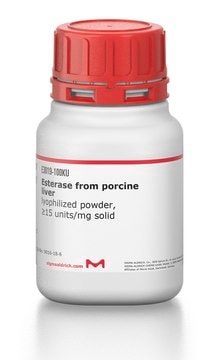G7753
Glycol chitosan
≥60% (titration), crystalline
Synonym(s):
Glycol chitin, deacetylated
Sign Into View Organizational & Contract Pricing
All Photos(4)
About This Item
Recommended Products
form
crystalline
Quality Level
mol wt
degree of polymerization ≥400
concentration
≥60% (titration)
storage temp.
−20°C
Application
Glycol chitosan increases membrane permeability and leakage in Glycine max Harosoy 63w cells.
Other Notes
To gain a comprehensive understanding of our extensive range of Polysaccharides for your research, we encourage you to visit our Carbohydrates Category page.
Storage Class Code
11 - Combustible Solids
WGK
WGK 3
Flash Point(F)
Not applicable
Flash Point(C)
Not applicable
Personal Protective Equipment
dust mask type N95 (US), Eyeshields, Gloves
Choose from one of the most recent versions:
Already Own This Product?
Find documentation for the products that you have recently purchased in the Document Library.
Customers Also Viewed
Gianni Ciofani et al.
International journal of nanomedicine, 7, 19-24 (2012-01-26)
Boron nitride nanotubes (BNNTs) have attracted huge attention in many different research fields thanks to their outstanding chemical and physical properties. During recent years, our group has pioneered the use of BNNTs for biomedical applications, first of all assessing their
D H Young et al.
Plant physiology, 70(5), 1449-1454 (1982-11-01)
Treatment of suspension-cultured Glycine max cv Harosoy 63 cells with soluble chitosan (20-500 micrograms per milliliter) increased membrane permeability as shown by leakage of electrolytes, protein, and UV absorbing material. Severe damage to the cell membrane by chitosan (100 and
Yong-Su Song et al.
Microbial pathogenesis, 129, 277-283 (2019-03-03)
To investigate the temperature requirements of chitosanase activity, as well as the degradation patterns generated by enzyme-induced chitosan oligomer hydrolysis, Pedobacter sp. PR-M6 was inoculated onto 0.5% colloidal chitosan medium agar plates. Cell growth was higher at 30 °C than at
Navneet Kaur et al.
Carbohydrate polymers, 237, 116170-116170 (2020-04-04)
Poly (lactide-co-glycolide) (PLGA) nanoparticles surface functionalized with water soluble glycol chitosan (GC) and carboxymethyl chitosan (CMC) has been studied for their drug (Paclitaxel and Doxorubicin) loading, yield, cellular uptake, serum protein adsorption and hemocompatibility. It was observed that Paclitaxel (Ptxl)
Beom Ryong Kang et al.
Carbohydrate polymers, 260, 117799-117799 (2021-03-14)
Bacillus amyloliquefaciens strain PPL shows a potential for the control of phytopathogenic fungi. In the present study, upon growing the strain PPL on various forms of chitosan (0.5 % powder, 0.1 % soluble, and 0.15 % colloidal) as the carbon
Our team of scientists has experience in all areas of research including Life Science, Material Science, Chemical Synthesis, Chromatography, Analytical and many others.
Contact Technical Service




